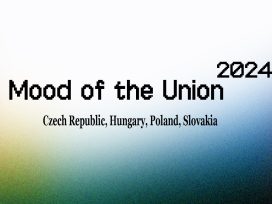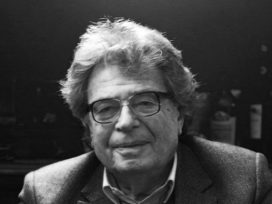A Hungarian writer, known worldwide; a political thinker who greatly influenced the intellectual life of the last fin de siècle; the third member of the great Central European triad, together with Milan Kundera and Danilo Kiš; one of the intellectual leaders of the democratic transformation of Hungary. György Konrád is gone.
He was born near the eastern border of Hungary, in Berettyóújfalu, into a relatively well-to-do Jewish family. At the age of 11, after the arrest of his parents by the Gestapo, he left for Budapest with his older sister and two of their cousins. The next day, the deportation of Jews from the countryside began. They were sent to Auschwitz, from where none of his Jewish schoolmates ever returned. Favoured by fortune, all of his family members met after the war. His parents, who had been deported to Austria, survived too. (He tells his story in his memoir A Guest In My Own Country (Elutazás és hazatérés).
Konrád’s first novel, The Case Worker (1969), was a poetic vision of the Kafkaesque reality of ‘existing socialism’. You did not misread: it is both reality and vision. The traditional forms of expression available at the time would have been unable to break through the thick crust of socialist life. Constructed around the relationship between the social worker and an idiotic boy, the novel’s expressive streams of imagery describe defencelessness, deterioration, decay, destruction, decomposition, and decline. Dense metaphors reveal a reality camouflaged by appearances.
Of course, the official reception of the novel was muted, and even more so about its success in western countries. While it ensured him the friendship of the best of his generation (the writers Miklós Mészöly and Gyula Hernádi, the philosopher Ferenc Fehér, the film directors Károly Makk and Miklós Jancsó), his less talented colleagues, in perfect accord with the cultural censors, accused him of ‘discrediting’ Hungary. They, who did not write as the imperialists wanted, were, in their opinion, more talented. Never would they be as famous as Konrád. And never would they pocket those huge royalties, in hard currency. In my debutant years this was the dominant opinion. I hardly realized, and only relatively late, how mendacious it was. I will never forgive them this poisoning.
In 1973, Konrád lost his job as urban sociologist and was unemployed, because he insisted on doing what he thought was the right thing to do, regardless of political taboos and interdictions. He had already been harassed by the police after trying to smuggle out the manuscript of a work by his younger colleague Miklós Haraszti – ‘Piece-Work’ (‘Darabbér’), published in 1975 by New Left Review. A year later, the police raided the countryside house that he rented together with the sociologist Iván Szelényi. The manuscript of their work in progress, The Intellectuals on the Road to Class Power, was found and confiscated.
Luckily, the manuscript existed in three copies, and one copy had been buried every evening in the garden. They succeeded in getting it out of the country and published it in France and England. They became personae non gratae and were allowed, even encouraged, to leave forever. Szelényi accepted the offer, Konrád remained. His second novel, The City Builder (A városalapító), was still published in Hungary (albeit in mutilated form), but thereafter, until the eve of the regime change, he was not allowed to publish legally. Abroad and in the underground press, however, he published numerous essays, becoming the most influential thinker of the nascent democratic opposition.
That was when I met him. Bugged, tailed, surrounded by denouncers, he preserved his imperturbable, serene calm. He was a wise person, attentive and friendly even to such no-name youngsters such as me. A few years earlier I had still been a featherbrain, dreaming about a Marxist renaissance; it was only with the prohibition of Solidarność and the shock of the martial law in Poland that I grew up. In that desperate situation, the thought of Konrád, Kundera and Kiš brought some hope and consolation. They argued that our societies were basically western constructions, and that everything that was anti-individualist and antiliberal in them was the consequence of the situation forced upon us by the Russian occupation. We only had to rid ourselves from the Russian yoke and, one after another, we would return to that Europe to which we were sometimes allowed to travel (and sometimes not).
And then it happened. But the liberal democracy that emerged after the free elections proved again to be a transitory episode, as so often in Hungary’s history. There were warning signs almost from the very beginning. Hate speech, including antisemitism, reappeared in politics and, though limited, came from within the governing right centre party. The Democratic Charter was initiated in response, with Konrád as one of its spokesmen. Because of the weakness of the political centre, the legal successor of the former communist party succeeded in gaining control over the movement. This was the beginning of the end of the Alliance of Free Democrats, the successor party of the democratic opposition.
Today the political space is again dominated by patriots hallucinating about the nation. It was in vain that György Konrád exhorted us to be matriots – because Central Europe is motherlike. Now, shaking the bars of his crib, playing with his own genitals, fouling his own feet, you have a motherless, idiotic little boy – Hungary.
Yes, Central Europe remained a dream. But a dream is not nothing. During the three decades in which the belief prevailed that, if left alone, Hungarian society would prosper, brought an enormous cultural boom. I suspect that that belief was partly due to Konrád’s imperturbable, serene optimism. Those decades laid the foundation for a new, internationally successful style of Hungarian literature. True, the new prose is mostly dark and pessimistic– just think of Krasznahorkai! – but even pessimistic writing needs some optimism. Without hope, one cannot write.
Konrád, meanwhile, was elected president of the International Pen Club, and twice president of the Berlin-Brandenburg Academy of Arts. He published a number of novels, among them the late masterpiece A Guest In My Own Country. And when at home, in Hungary, smoking his pipe in the garden of his house in the Balaton region, he willingly conversed with younger colleagues from the nearby writers’ house. I am lucky, really lucky, to have been acquainted with him.

György Konrád. Photo by Gáspár Stekovics from Wikimedia Commons








